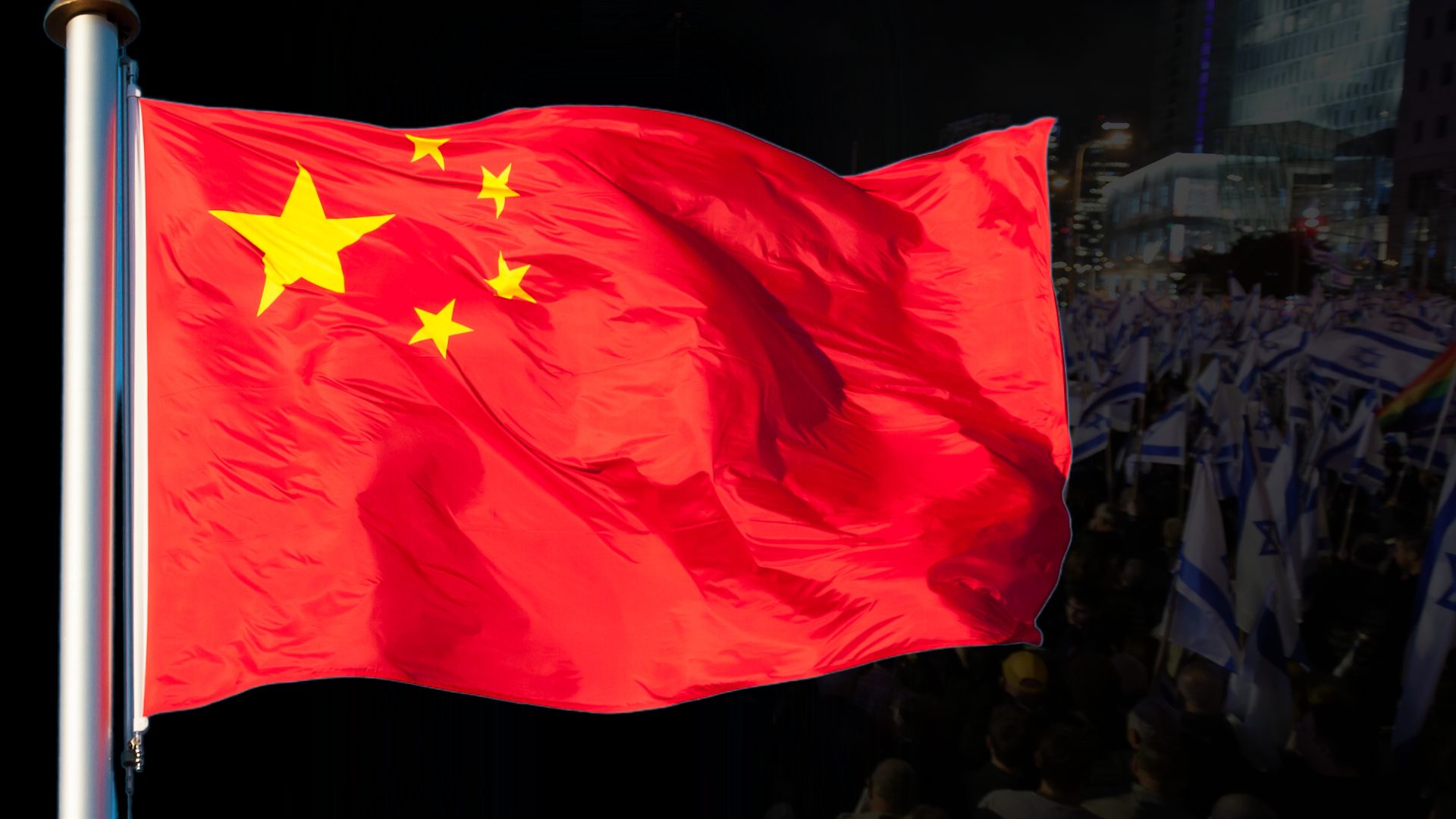Publications
INSS Insight, No. 1731, June 12, 2023
While western media has widely covered the so-called “judicial reform” in Israel, with reports about this coverage frequently appearing in the Israeli media, Chinese media coverage of these events has so far evaded the Israeli audience. As the Chinese authorities, of course, do not perceive the idea of liberal democracy as particularly appealing, and since the media in China is subject to strict scrutiny and censorship, Chinese coverage of the “reform” and the protests against it are presented somewhat differently than in democratic countries. The media in China reflects to a great extent, although not always, the government’s perspective, and therefore a review of such coverage provides a glimpse into its ways of thinking about the reform and their significance for China–Israel relations.
Various news websites in China began covering Israel’s “judicial reform” in late December 2022, and since January 2023, they expanded their coverage, as the demonstrations against the reform started to gain momentum. While the level of interest in the protests in the West has been high all along, reports in China have been rather scarce, with a considerable part – as is customary in China when covering many other subjects – actually being one recycled report from the same central news website. Be it as it may, these reports have not occupied center stage in China, while the attention social media has given the issue has also been rather limited.
The main characteristics of the Chinese coverage of the judicial reform in Israel, apart from being relatively small-scale, include three major aspects: (a) the view of the crisis in Israel as leading to a potential rift in Israeli–US relations (presented as a positive development), and also as another attempt by the United States to impose its ideology in the world by interfering in Israel’s internal affairs (either to prevent Israel from implementing a reform all together, or to push Israel toward one); (b) reducing the implications of the reform and reflecting on the actual importance of liberal democracy and/or presenting the inherent problems, in Chinese eyes, of such democracy in general; (c) using the internal schism in Israel, and occasionally the reform itself, to ponder over the very future of the State of Israel. And yet, one must admit that most of the coverage, certainly on formal channels, is quite balanced. It should be noted that the common term used by Chinese media is “reform,” rather than “revolution,” which has very complex connotations in China. Accordingly, we have chosen to use the former term in this article.
Characteristics of the Coverage
A turning point in China’s coverage of the reform was marked by the dismissal of the Minister of Defense Yoav Galant on March 26, 2023, which caused widespread protests throughout Israel and consequently led the Chinese media to briefly expand its coverage of the subject. For example, on March 27, the “People’s Daily” widely covered the reform in an article titled: “Defense minister dismissed as judicial reform advances”; the report also quoted Prof. Manuel Trajtenberg, head of the Institute for National Security Studies, who said that “Netanyahu can sack his defense minister, but he cannot dismiss his warnings.” The same day, China’s official state news agency and the largest media entity in the country, Xinhua, published an article on the subject, under the same title. Other reports, such as one titled “630,000 take to the streets to march and demonstrate–what’s wrong with Israel?,” claimed that Galant’s dismissal was the result of his objection to the reform, while others asserted that the dismissal intensified the wave of protests and also brought Israel’s economy to a complete stand-still.

Following the suspension of the legislation on April 10, Xinhua published a lengthy article called “A mysterious research institute emerges–is the United States behind the crisis in Israel?” The article presented the Kohelet Policy Forum as a US-financed research institute driving the reform and questioned the extent of the involvement of the US, which “has a habit of interfering in the internal affairs of other countries.” That said, the latter half of the article claimed just the opposite, that the US was actually funding the anti-reform demonstrations. The last part of the article contained a more balanced discussion, which included quotes from various western media outlets, and posited that the reform and the protests alike were the result of other, deeper, social and political causes within Israel. Researchers in Chinese universities, such as Fudan or the Shanghai Academy of Social Sciences, have also published articles in an attempt to explain the reform and the protests, in both the American context as well as what is referred to as the “Wave of Reconciliation” in the Middle East (Iran, Saudi Arabia, Syria, and so forth), pondering Israel’s future in general. Such pondering about the future of Israel (namely the country’s survival or nature) appears frequently in many of the articles published in recent months. The few demonstrations held by supporters of the reform, however, have received minimal coverage.
Presenting the Judicial Reform and the Demonstrations
Various news websites in China have emphasized that the planned reforms in the judicial system have been the fuse that ignited the nationwide demonstrations and that these reforms are seen as destructing the democratic institutions and undermining the principal of the separation of powers in Israel. Of all the suggested reforms, those that attracted special attention were the increased involvement of politicians in the selection of judges, granting greater degree of freedom to the executive branch, increasing the government’s influence on Israel’s political life, and the weaking of the Supreme Court. The issue of Prime Minister Netanyahu’s personal legal affairs and the question of whether the reform serves his desire to escape his own trial have also been raised in some of the reports.
Most of the Chinese media reports, mostly based on information received from foreign news agencies, have focused on Israel’s hi-tech industry and its unwavering objection to the reform, quoting Israel’s allies, such as the United States, which oppose the advancement of the reform, and the Israel Democracy Institute, which has stated that the fast-paced promotion of the reform has driven Israel “to the brink of a constitutional crisis.” As for the demonstrations, most reports have described them as “chaos” or as the “Israeli Spring” (as an analogy to the Arab Spring), “the largest protest in Israeli history,” and “the most subversive political change since the establishment of the State of Israel.” The Chinese media has also claimed that the demonstrations are causing severe damage to Israel’s social order, security, and stability. For instance, it reported that the “turmoil” in Israel has also led to a change in the political and security situation in the country, and that Israel is filled with a “sense of crisis” following the wider geo-strategic changes in the region, namely the tension with the Palestinians and the agreement reached by Saudi Arabia and Iran in Beijing regarding the restoration of diplomatic relations between the countries and the reopening of their respective embassies. This comes in addition to the systemic paralysis crippling Israel, due, among other things, to the shutdown of the education system, public services, and local businesses.
Several media outlets in China have chosen to focus on Israel’s social fabric and described the protests as a struggle between the lower strata and the elite, the secular and the religious, and people of Ashkenazi and Mizrachi descent, pointing out that the protests are an expression of the different backgrounds and cultural values of East and West, as well as of Israel’s “typical class system.” Some mention the fact that these social schisms between right and left, after having been exploited by Netanyahu for many years, are getting out of hand, and that the protests are tearing Israel apart. Therefore, one media outlet has claimed that the reform affects not only the judicial system and Netanyahu’s political career but also Israel’s social future, and it raises the question of whether Israel is becoming an Apartheid state that discriminates between its own citizens.

In contrast to their Israeli counterparts, Chinese news websites hardly feature any unmediated comments. The few comments that can be found on official websites called for “respecting the will of the people” or claimed that “Netanyahu is seeking dictatorship.” Other comments did not refer to the judicial reform but rather used the events in Israel to criticize Israel’s diplomatic ties with the United States, an issue that seems to preoccupy the Chinese a great deal and has appeared in many reports. The popular Chinese social network Sina Weibo has some references to the reform, with the hashtag “Mass Protests in Israel.” Among other things, it is noted that the extreme right wishes to get rid of the judicial system and use the reform to free itself of all constraints; others point out that it is unclear whether the reform is right or wrong; while other users share photos of the many citizens taking part in the mass demonstrations, with some even calling for “uncompromising opposition to false western ideas,” such as “constitutional administration,” “separation of powers,” and “independence of the judicial branch.”
Conclusion
The fact that reports of the events in Israel surrounding the judicial reform plan have appeared almost from the onset in China, whose government is unsupportive (to say the least) of coverage of demonstrations in other parts of the world, suggests that even non-liberal, non-democratic countries follow these happenings and may draw some operative conclusions from them. The nature of the coverage itself reflects the character of the Chinese regime and its world view, which regards liberal democracy or protests against the authorities as problematic, as well as reflecting its strategic rivalry with the United States and an attempt to promote China’s position in the Middle East. Specifically, and similar to other countries, China also perceives Israel’s condition as unstable, which might reduce its capability to cooperate with China that is seeking stability, and even more – to cope with the Middle Eastern arena. The special focus of some of the reports on Israel–US relations may indicate that various countries could potentially use the reform as a means of driving a wedge between Israel and its allies. Israel must be aware of this fact and act to make all parties aware of its formal position, while at the same time also strengthen its image in the Chinese media in general.



